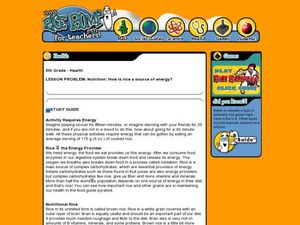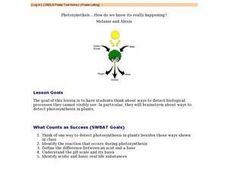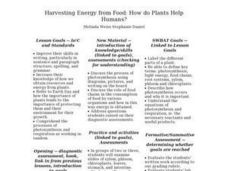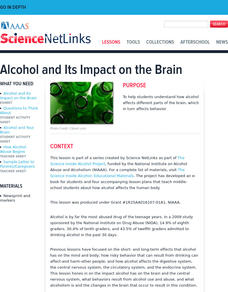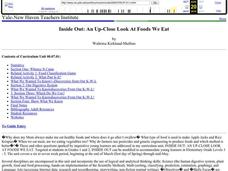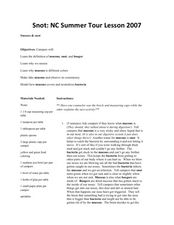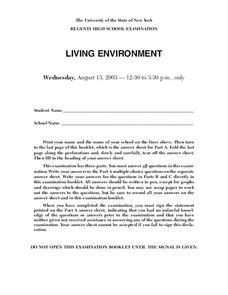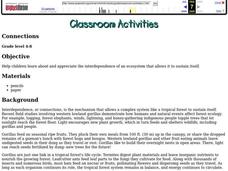Curated OER
Geometry: Practical Applications of the Distance Formula
Students, working independently and in groups, apply the distance formula to practical situations. After solving various problems, students in pairs design coordinate planes from the school blue print to measure the distance from the...
Curated OER
The Three Worm Phyla
Ninth graders examine the three worm phyla. In this classification instructional activity, 9th graders observe, compare and contrast the planarian, tapeworm, and fluke.
Curated OER
Recovering From Bad Eating
Students take a closer look at eating disorders. In this personal health lesson, students research common eating disorders, investigate treatments for the disorders, and make presentations that highlight their findings.
Curated OER
Good Food, Good Health
Learners investigate how food provides energy for the human body. In this physical health instructional activity, students access online resources to identify how certain foods can affect their health. Learners discuss how many servings...
Curated OER
Rice as a Source of Energy
Fifth graders investigate the nutrition in rice. In this rice lesson, 5th graders discover that rice is a great source of energy. Students compare foods to rice to see the differences in the nutritional value. Students classify foods in...
Curated OER
Worm Watching
Learners examine the role earthworms play in building soils. They discuss worms and what they do with soil, make predictions and draw pictures, and observe their worms in soil over a two week period.
Curated OER
Photosynethsis....How do we know it's really happening? - Biology Teaching Thesis
Students think of one way to detect photosynthesis in plants besides those ways shown in class. They identify the reaction that occurs during photosynthesis. Students define the difference between an acid and a base. They identify acidic...
Curated OER
Harvesting Energy from Food: How do Plants Help Humans?
Beginning botanists view slides of plant vascular tissue. They watch Magic School Bus Gets Planted, which you can find online, and then write a summary of what they have learned about plants. This lesson could be used with upper...
Curated OER
Alcohol and Its Impact on the Brain
Students examine water as it changes states. In water and ice activity students study the water cycle and what happens to it as it changes state.
Curated OER
Inside Out: An Up-Close Look At Foods We Eat
Fourth graders identify the origins of meats and vegetables consumed by humans on a daily basis. They classify foods (meats, dairy products, grains...) and create a food pyramid.
Curated OER
Blend-A-Plant Levels of Organization
Young scholars' identify and analyze the levels of organization and the emergent properties through experimentation. Students' apply the differences in the properties of a plant before and after it has been subjected to a kitchen blender.
Curated OER
Snot: NC Summer Tour Lesson 2007
Students study various aspects of mucous. In this mucous lesson, students investigate the purpose of mucous. Students create fake mucous.
Curated OER
Owl Pellet
Students discover an owl's diet. In this animal science lesson, students observe owl pellets, determining what the owl ate. Students put together the owl's food chain, after determining the animals in the owl's diet.
Curated OER
Nutrition 2: Good Food, Good Health
Learners examine how food provides them with energy and materials for their body. In groups, they identify good and bad foods to maintain a healthy lifestyle. Using the internet, they research how food can affect their overall health.
Curated OER
Graphing Dairy Production Statistics
Students discover the total impact of milk on our society by graphing data. In this statistics lesson, students discover the dirty and sometimes unhealthy road milk travels to get into our bodies. Students analyze dairy consumption...
Curated OER
Living Environment
In this environmental instructional activity students complete a series of multiple choice and short answer questions on animal populations, cell structure and chromosomes.
Curated OER
CONNECTIONS
Students study the interdependence of an ecosystem that allows it to sustain itself. They examine the Western lowland gorillas for an example.
Curated OER
Cold and Flus
Students investigate the difference between viral and bacterial illnesses. In this health lesson, students learn the symptoms of each and examine ways to prevent spreading virusus and bacteria.
Curated OER
Comparison of Four-, Six-, And Eight-bp Cuts in Calf Thymus Dna
Students investigate the use of restriction enzymes to recognize a four-, six-, and eight-nucleotide sequence. They utilize restrictive endonucleases to cut Thymus DNA and compare results by viewing the DNA fragments on Agarose Gel...
Curated OER
Graphing Dairy Production Statistics
Learners collect data about dairy production. In this geometry lesson, students formulate and model problem solving. They collect data and plot it on a graph.
Curated OER
The Human Organism
Students identify their feelings and learn constructive ways of handling conflict. In this feelings and conflict lesson, students read a story about conflict and identify ways to understand emotions and resolve conflict.
Curated OER
Making Blood!
students research blood's components, and use their math skills to recreate a model of whole blood using commonly found food items.
Curated OER
Aerobic and Anaerobic Conditioning
Students view the A.D.A.M. computer simulation of aerobic and anaerobic exercise. They break into groups and members brainstorm and list as many aerobic and anaerobic exercises as possible in five minutes.
Curated OER
Regulating the Harvest
Students study the effect of trapping in the Illinois Territory in 1805 and compare it to trapping today. They participate in a role playing activity in which they discover how practices in early Illinois Territory led to wildlife...






